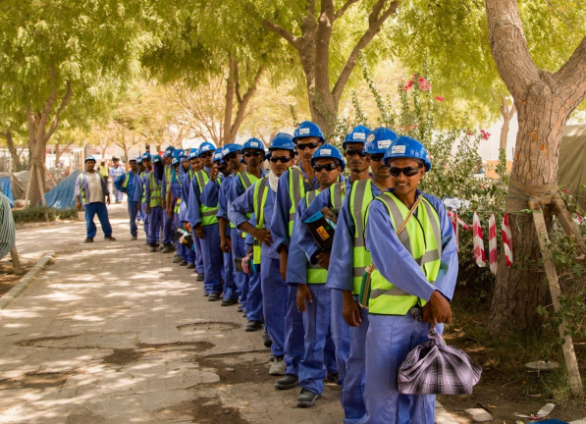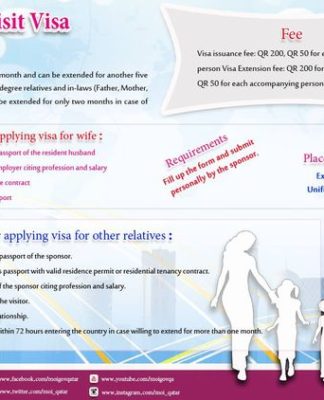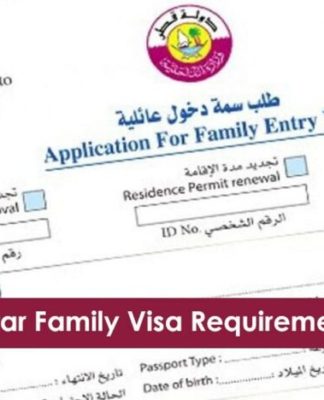
An audit of contractors on 2022 World Cup projects in Qatar found many to be working their staff too hard, according to a new report.
For example, half of the 10 contractors interviewed failed to give their employees one day off a week.
And many construction workers faced 72-hour weeks, instead of the 48 hours stipulated in a charter established by tournament organizers.

Peter Kovessy / Doha News
Reconstruction of Khalifa Stadium, for illustrative purposes only
These findings were published last week in an independent report commissioned by the Supreme Committee for Delivery and Legacy (SCDL).
The Annual External Compliance Report was authored by London-based ethical trade consultancy Impactt.
It was hired by the SCDL in 2016 amid growing international concernabout human rights violations in Qatar, and will be monitoring World Cup project sites in the coming years.
Charter compliance
Currently, about 10,000 people are working on World Cup projects in Qatar. That number is expected to surge to a peak of 36,000 workers by next year.

Marco Zanferrari/Flickr
Photo for illustrative purposes only.
To win tenders for tournament projects, contractors and subcontractors had to agree to abide by the SCDL’s workers’ charter.
The document covers living conditions, ethical recruitment, workers’ nutrition and on-site health and safety, among other things.
During its first audits, Impactt spoke to 10 contractors and 253 workers over the past year to see whether companies were adhering to the charter.
Findings
While companies mostly complied with rules about housing and safety, many fell down when it came to issues such as proper rest and setting up grievance mechanisms.
For example, some employees worked up to 18 hours a day (instead of eight to 10).
However, Impactt said that “solid progress” was made after the non-compliance issues were pointed out.

Peter Kovessy / Doha News
Khalifa Stadium renovations for illustrative purposes only.
It added that a follow-up audit conducted in January of this year found that 78 percent of issues were resolved, especially those involving medical care, transportation and end-of-service procedures.
That said, eight out 10 contractors still failed to provide an annual flight home to their employees.
Because this requirement is not legally required in Qatar, it “highlights the barriers which the SC faces in trying to advance practices beyond local law and common business practice,” the report said.
Notably, World Cup project workers account for just a fraction of Qatar’s overall blue-collar workforce. Most employers in the country are not as stringently monitored or bound by the same higher standards.
Recommendations
Many of Impactt’s recommendations for the contractors involved making changes to company culture.

Peter Kovessy / Doha News
Photo for illustrative purposes only.
For example, it urged that more be done to:
- Amplify workers’ voices, because capturing their feedback will help management and 2022 organizers best understand which issues matter to their staff;
- Build management skills by training foremen, accommodation managers and welfare officers to develop respectful people skills; and
- Shore up grievance mechanisms to ensure workers are treated fairly and help drive positive change.
Impactt also urged the SCDL to participating in “multi-stakeholder action” to resolve more systematic problems.
These include the exorbitant recruitment fees workers pay to get to Qatar and the substitute contracts that may await them upon arrival.
For its part, the SCDL said in a statement:
“While the findings clearly state there are challenges, they also demonstrate our continued commitment to this process.
We will do everything necessary to ensure the issues identified are dealt with promptly.”
What’s to come
In the coming year, 100 percent of contractors across nine active projects will be audited for compliance to the charter.
At least five percent of the workers employed by each contractor will also be interviewed.

Impactt
Impactt initial audit scope
Additionally, the SCDL has agreed to establish a worker hotline for grievances, continue to work with international unions on joint health and safety inspections of construction and housing sites; and complete a worker survey.
Impactt interviewed a small sample of workers about their priorities and found that respect, a better future for their families and income security were among the things that mattered most to them.
However, a much larger sample is needed for these results to be considered representative, it said.






























